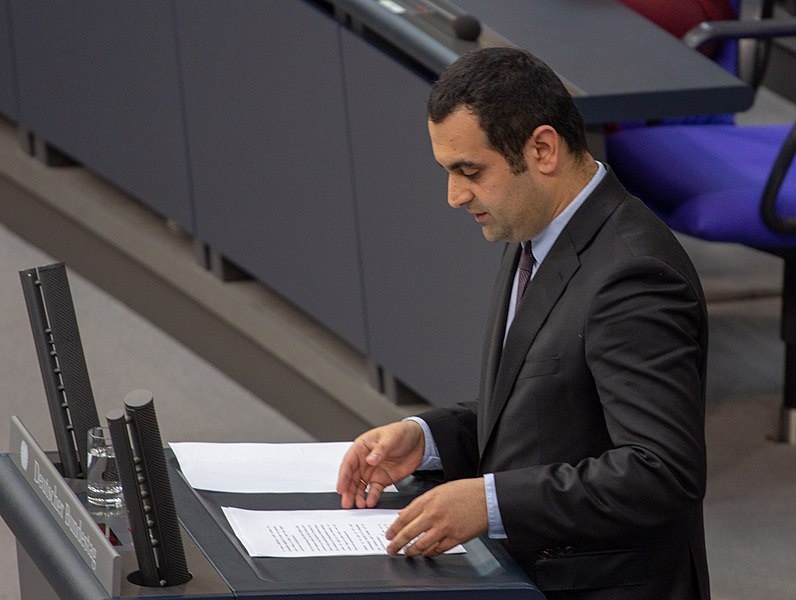10 questions for Bijan Djir-Sarai: BDS, Israel, Iran

Bijan Djir-Sarai was born in 1976 in Tehran/Iran. In 1987 Bijan Djir-Sarai came into the care of his uncle in Grevenbroich, without knowledge of the German language.
The father had previously studied in Germany and wanted to offer his son a better outlook on life than he had in Iran. Bijan Djir-Sarai attended grammar school and later joined the FDP.
In 2009 he succeeded in moving into the German Bundestag. One of his main topics is the human rights situation in the Middle East. In 2016, after the FDP (Free Democratic Party) had failed to make it into the Bundestag in the previous legislative period, he succeeded in rejoining the German parliament.
Bijan Djir-Sarai is foreign policy spokesman for the FDP parliamentary group in the Bundestag and chairman of the NRW regional group.
Ruhrbarone have asked Bijan Djir-Sarai ten questions about the BDS, the Middle East and the rather sad role of social democracy, once so proud, in Middle East politics.
And have received ten replies.
Ruhrbarone: Mr. Djir-Sarai, the resolution against the so-called BDS movement, which was passed by all parliamentary groups, emerged from your parliamentary group. Are you satisfied with this decision?
Bijan Djir-Sarai: I am very satisfied with the resolution and am pleased that the initiative has received such broad parliamentary support.
Ruhrbarone: There is criticism that this resolution would go too far, because general criticism of Israeli politics could also be affected by the resolution. Are these fears justified?
Bijan Djir-Sarai: These fears are absolutely unjustified. We live in a free country, in which every human being is allowed to criticise every government in the world at any time.
Ruhrbarone: Some Israeli and Jewish critics of the initiative warn against equating BDS with anti-Semitism in general. Can this criticism simply be ignored?
Bijan Djir-Sarai: The argumentation patterns and methods of the BDS movement are not only anti-israeli, but also antisemitic. Some of their campaigns are reminiscent of the darkest times in our history. With these campaigns, the movement defames and brands people on the basis of their Jewish identity as a whole and attacks Israel’s right to exist. This is inhumane and has nothing to do with mere criticism of the Israeli government.
Ruhrbarone: What kind of organizations and projects are affected by the resolution?
Bijan Djir-Sarai: On the one hand, the motion condemns the BDS movement and does not prohibit it. On the other hand, the German Bundestag decides not to support the BDS movement or other groups that support its goals. The federal government is called upon not to support any events of the BDS movement or of groups actively pursuing its goals.
Ruhrbarone: Doesn’t the cross-party resolution also weaken moderate forces, e.g. in the Gaza Strip, which have nothing to do with the terrorist organisations Hamas or Palestinian Islamic Jihad and perhaps even try to combat them?
Bijan Djir-Sarai: No, I do not see the danger. There will always be ways of working with the really moderate forces.
Ruhrbarone: The aforementioned groups, Hamas and Palestinian Islamic Jihad, are financed from Iran. You have Iranian roots. A few months ago, the German Federal President, Dr. Frank-Walter Steinmeier, congratulated the regime in Iran on the anniversary of the Islamic Revolution „in the name of the German people“. Also in your name?
Bijan Djir-Sarai: I could not put my name under such a congratulatory letter. Iran’s aggressive foreign policy destabilizes the entire Middle East and tramples on human rights in its own country on a daily basis. People are wrongly held in prison, tortured and killed. Of course it is right to engage in dialogue, but sending congratulations on seizing power to an authoritarian regime that despises humanity goes far beyond that.
Ruhrbarone: Topic German Social Democracy: A representative of the Iranian think tank IPIS was present at a recent Friedrich-Ebert-Foundation event. IPIS organised the infamous Holocaust denialist conference with Islamists and Nazis in 2006.
There was hardly any reaction to anti-Semitic slogans, or to conspiracy theories at the FES event. The human rights situation was not an issue. What is wrong with the SPD in the Iran question?
Bijan Djir-Sarai: In Germany wee often lack a realistic picture of the situation in the Middle East. The way we assess the region is often very naïve. So I’m not surprised about this invitation. Nor is it surprising that Germany is not being taken seriously in the region at the moment.
Ruhrbarone: What can Germany do, to revive the peace process in the Middle East?
Bijan Djir-Sarai: Germany currently plays no role in the Middle East. Neither a German nor a European strategy can be discerned. That is regrettable – especially since it is about our direct neighbourhood and all events have a direct impact on us. Together with its European partners, Germany could and should become more involved in the region and, in particular, exert greater pressure on Iran.

Ruhrbarone: Again on a sad topic: The SPD. On May 6, 2019, the day before Israel was again massively fired at with rockets from the Gaza Strip, the Ruhrbarones telephoned Arye Sharuz Shalicar, advisor to the Israeli Foreign and Intelligence Minister.
One point of criticism was the German attitude in the UNO, where we sometimes abstained, sometimes voted for Israel, sometimes against Israel. Together with dictators. Federal Foreign Minister Heiko Maas (SPD) recently criticized the unfair treatment of Israel in the UN. Does this now only affect the Ruhr barons schizophrenically?
Bijan Djir-Sarai: It’s not only the Ruhr barons who are schizophrenic. On the contrary, we have here another fine example of the lack of substance in Germany’s current foreign policy. By voting in this way, the Federal Government is making itself common with highly dubious authoritarian regimes – while boasting in Sunday speeches at Israel’s side. With the best will in the world, this does not ensure credibility.
Ruhrbarone: There is currently a crisis between Iran and the USA. Iran has announced a quadrupling of its uranium enrichment. Despite the human rights situation in Iran and previous experience with the regime in Tehran, the Europeans are relying on appeasement. The USA and Israel are looking for change through pressure. As foreign politicians with a German-Iranian perspective: Hasn’t a radical correction long been necessary in German policy towards Iran?
Bijan Djir-Sarai: It is high time that Germany and Europe recognised that Iran’s aggressive behaviour in recent years has destabilised the entire region. In the wars in Syria and Yemen Iran plays the decisive role. In Lebanon, too, it has its fingers in the pie with its extended arm, the terrorist organisation Hezbollah; the regime is also actively promoting its ballistic missile programme. It can therefore be said that the initial hopes that Iran would take a more peaceful and cooperative path as a result of the JCPOA have been seriously disappointed. Accordingly, there is an urgent need to adapt the German and European diplomatic approach.
Translated with www.DeepL.com/Translator


